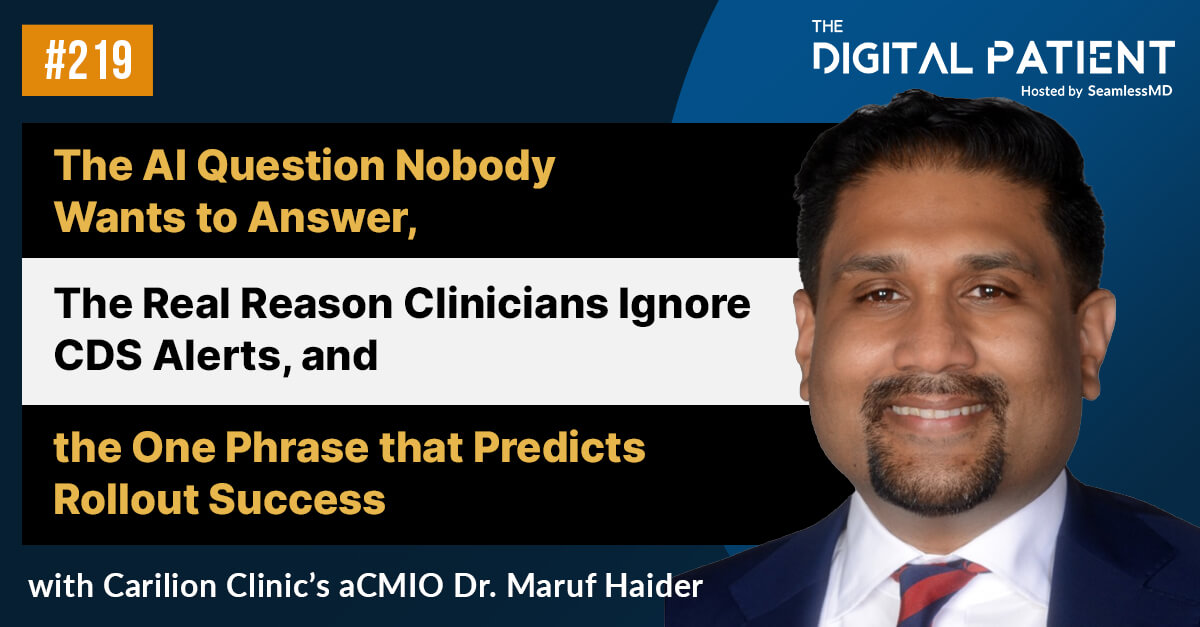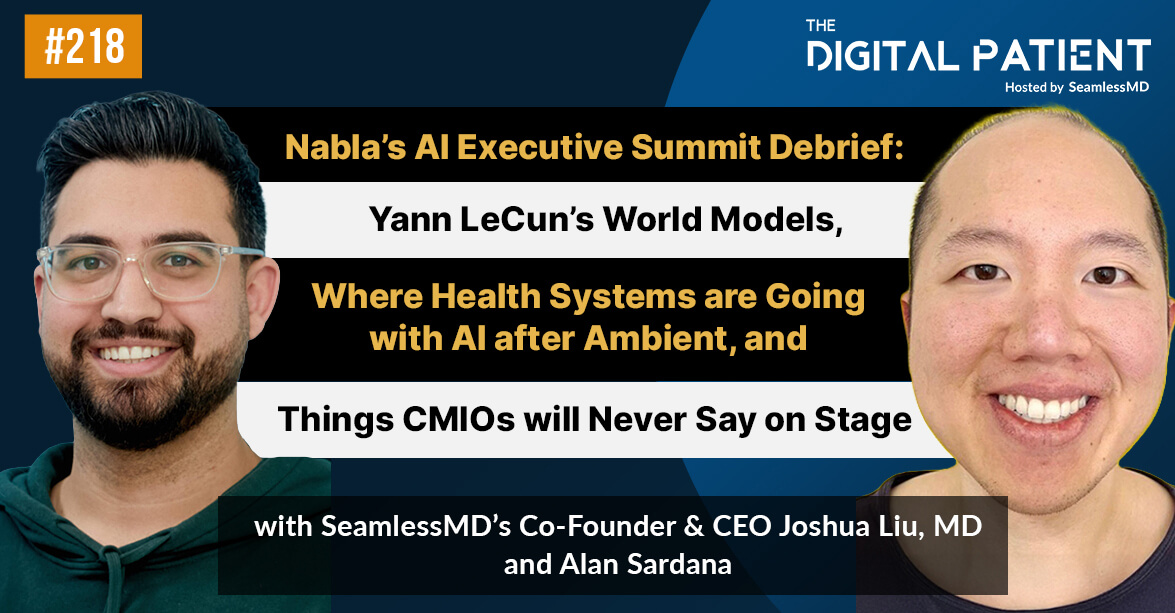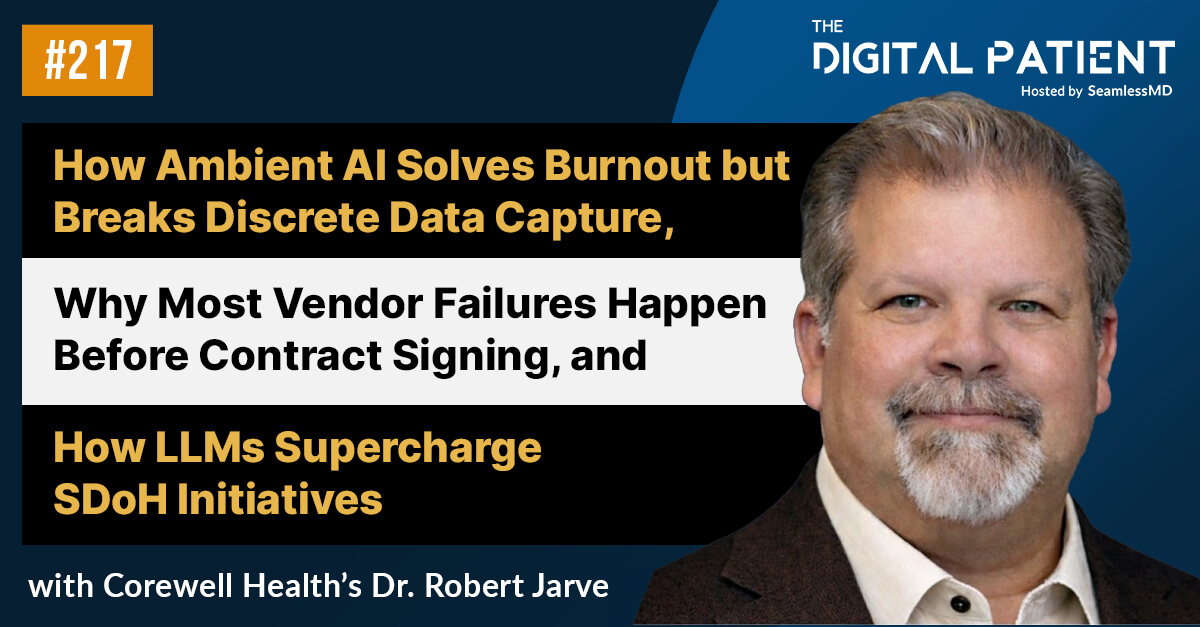Subscribe on: RSS | SPOTIFY | APPLE PODCAST | GOOGLE | BREAKER | ANCHOR
On this episode of "The Digital Patient" podcast, hosts Alan Sardana & Dr. Joshua Liu speak with Dr. David Putrino, Director of Rehabilitation Innovation at The Mount Sinai Health System, about Using Technology to Re-humanize the Patient Experience, the Problem with Funding Healthcare Innovation with Research Grants & Being Mission-oriented vs. Compliance-oriented. Click the play button to listen or read the show notes below.
Audio:
Video:
Guest(s):
Dr. David Putrino, Director of Rehabilitation Innovation at The Mount Sinai Health System
Dr. Joshua Liu (@joshuapliu), Co-founder & CEO at SeamlessMD
Episode 67 - Show Notes:
[0:00] Introducing Dr. David Putrino, Director of Rehabilitation Innovation at The Mount Sinai Health System;
[2:18] How Dr. Putrino grew up in Western Australia where telehealth was used to manage care early on because it was practical and necessary, and how he was shocked to see the level of resistance to digital care when he moved to the United States;
[4:40] Why Dr. Putrino moved to Harvard from the University of Western Australia to work with Dr. Emery N. Brown who was pioneering computational neuroscience;
[6:24] Why Dr. Putrino focuses his time at The Mount Sinai Abilities Research Center on making better neurological care more accessible and more affordable whilst creating community for its patients as community and support are significant drivers of rehabilitation and quality of life;
[10:15] How successful patient-facing technology leverage community co-design to support the experience that patients want, for example an experience that focuses on relationship-building and connection between patients and/or patient-to-provider, which in turn significantly improves patient adoption and adherence;
[11:25] How different stakeholders respond to different pitches, for example, clinicians, in addition to improving the patient experience, want evidence-based content that can help them save time and money, whereas administration is often concerned with billing codes and understanding how to make the technology efficient and streamlined;
[17:20] Why Dr. Putrino believes grants often fund incremental science – which is important to answer certain questions – but rarely leads to implementing a valuable solution post-research;
[22:50] How Dr. Putrino learned of the disconnect between research and clinically-viable innovation during his final post-doc at NYU;
[27:48] Why Dr. Putrino advocates for health system leadership to find innovators who are mission-oriented and empower them to innovate by relaxing certain compliance for the sake of the mission and innovation and how this process was evident and proven during COVID-19;
[33:30] Why Dr. Putrino believes the more you can help others understand what you’re trying to do, the more they will want to help;
[35:00] How Dr. Putrino took it upon himself to transform his lab into Recharge Rooms leveraging multi-sensory experiences to reduce stress during COVID-19 for front line workers;
[38:40] Why Dr. Putrino believes the central piece to successfully integrating technology in healthcare is to focus on increasing the humanity of care delivery as opposed to saving dollars;
[42:05] Why Dr. Putrino is passionate about a new FDA-approved brain-interface technology he’s working on that uses a stent that enters the body through the jugular vein, travels into the superior sagittal sinus and can be used by ALS patients to control a computer;
Fast 5 / Lightning Round:
- What is your favorite book or book you’ve gifted the most?
“The Culture Code: The Secrets of Highly Successful Groups” by Daniel Coyle and “Where Good Ideas Come From: The Natural History of Innovation” by Steven Johnson
- How has an apparent failure set you up for greater success?
“My NYU Post-doc failure… After four years of work, we had achieved practically nothing.” - Would you rather have Super strength, super speed, or the ability to read people’s minds?
“Read people’s minds”
- What is something in healthcare you believe that others might find insane?
“Other than sticking brain implants in people? Exoskeletal robots… Implanted vagus nerve stimulators… Everything I work with on a daily basis is insane.”
- COVID-19 lockdown related – what is 1 hobby or activity you’ve gotten into since the pandemic?
“Pasta making!”
.svg)










.png)
